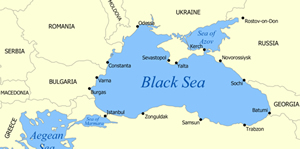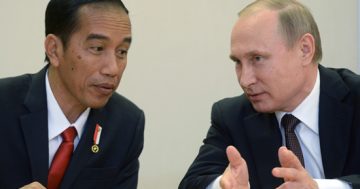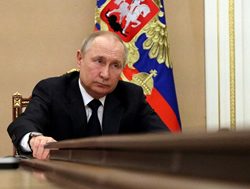While Russian President, Vladimir Putin tries to redraw the map of Europe, Shannon Vavra* talks to two United States lawmakers who are trying to scrap his playbook before he can take it any further.
 United States Senators Jeanne Shaheen (Democrat) and Mitt Romney (Republican) have introduced legislation into Congress in an attempt to conjure up ways to further box in Russian President, Vladimir Putin.
United States Senators Jeanne Shaheen (Democrat) and Mitt Romney (Republican) have introduced legislation into Congress in an attempt to conjure up ways to further box in Russian President, Vladimir Putin.
It follows concerns over whether the US has done enough to prepare for and deter Russian aggression in the Black Sea region, so that Putin doesn’t end up feeling empowered to strike out further beyond Ukraine.
“As Putin continues his war in Ukraine, the United States must be prepared to address the challenges he’s created in the immediate and long term for European and US security,” Shaheen said.
“That is precisely what our legislation seeks to do by looking at a critical geopolitical region — the Black Sea.”
Putin has long been interested in leveraging Russia’s access to the Black Sea as a way of changing the borders of sovereign nations to his advantage. To this end he ordered the invasion of Georgia, which borders the sea, in 2008, and the annexation of Crimea from Ukraine in 2014.
Now Shaheen and Romney are banking on the idea that if the US pays more attention to the Black Sea region and makes a concerted effort to shore up security concerns there, it might have a shot at stymying Putin’s progress.
“Control over access to the Black Sea is fundamental to his delusional dream of building a Russian empire. The US cannot allow that to happen,” Shaheen said.
The legislation, which is backed by a number of other Senators from both parties, would require the Administration of President Joe Biden to develop an inter-Agency strategy to increase security assistance to Black Sea countries.
Romney says the Black Sea has become increasingly critical as Putin continues to wage his unprovoked war in Ukraine.
“It has become clear that the US must have both a strategy and presence in the region,” he said.
“Our legislation aims to accomplish this by requiring the Biden Administration to develop a strategy to strengthen coordination between the US, NATO, and partners in the Black Sea in an effort to increase security, support economic prosperity, and promote democracy.”
World leaders have raised concerns that Putin isn’t interested in just going after Ukraine.
Putin’s allies have hinted at grander scenarios in which Putin takes on more far-flung battles.
Russia’s Lower House Speaker warned that the US ought to remember that Russia “gave” the United States Alaska in the 1800s (it was actually purchased for $US7.2 million) and that Moscow could seek to take it back.
Others have suggested Putin could go head-to-head with Poland, the US, or the United Kingdom.
Former Deputy Assistant Secretary of Defence for Europe and NATO Policy, Ian Brzezinski believes that if the US and its allies had stepped up and developed a weightier strategy in the Black Sea region years ago, we might not be facing a Russian war in Ukraine now.
“A more assertive policy is long overdue. The failure of the US and NATO allies to having a more robust defence of its interests in the Black Sea has actually provoked Russia and prompted Putin to be more aggressive,” Brzezinski said
“He (Putin) sees that as a sign of weakness and an opportunity to fulfil his revanchist territorial ambitions.”
Shaheen says Putin’s belligerence toward Ukraine was reaping global consequences, which is why strategic action was crucial to thwart his efforts.
The proposed legislation would touch on more than just military action. It would require the US Administration to develop a report on democracy, security, and economic initiatives in the region and new policy options for a more assertive engagement there.
The strategy would include plans to increase NATO capabilities in the region, including land and air forces, and military assistance specifically to Ukraine, Romania, Bulgaria, and Georgia.
It would also cover schemes to improve coordination with NATO forces, with better intelligence operations and systems to track Russian operations in the region, greater defence against hybrid warfare.
There would also be plans to support more independent media to counter Russian influence operations.
*Shannon Vavra is a national security reporter for The Daily Beast, covering the politics of war, national security, hacking, disinformation, and espionage. She can be contacted at [email protected].
This article first appeared on The Daily Beast website.










